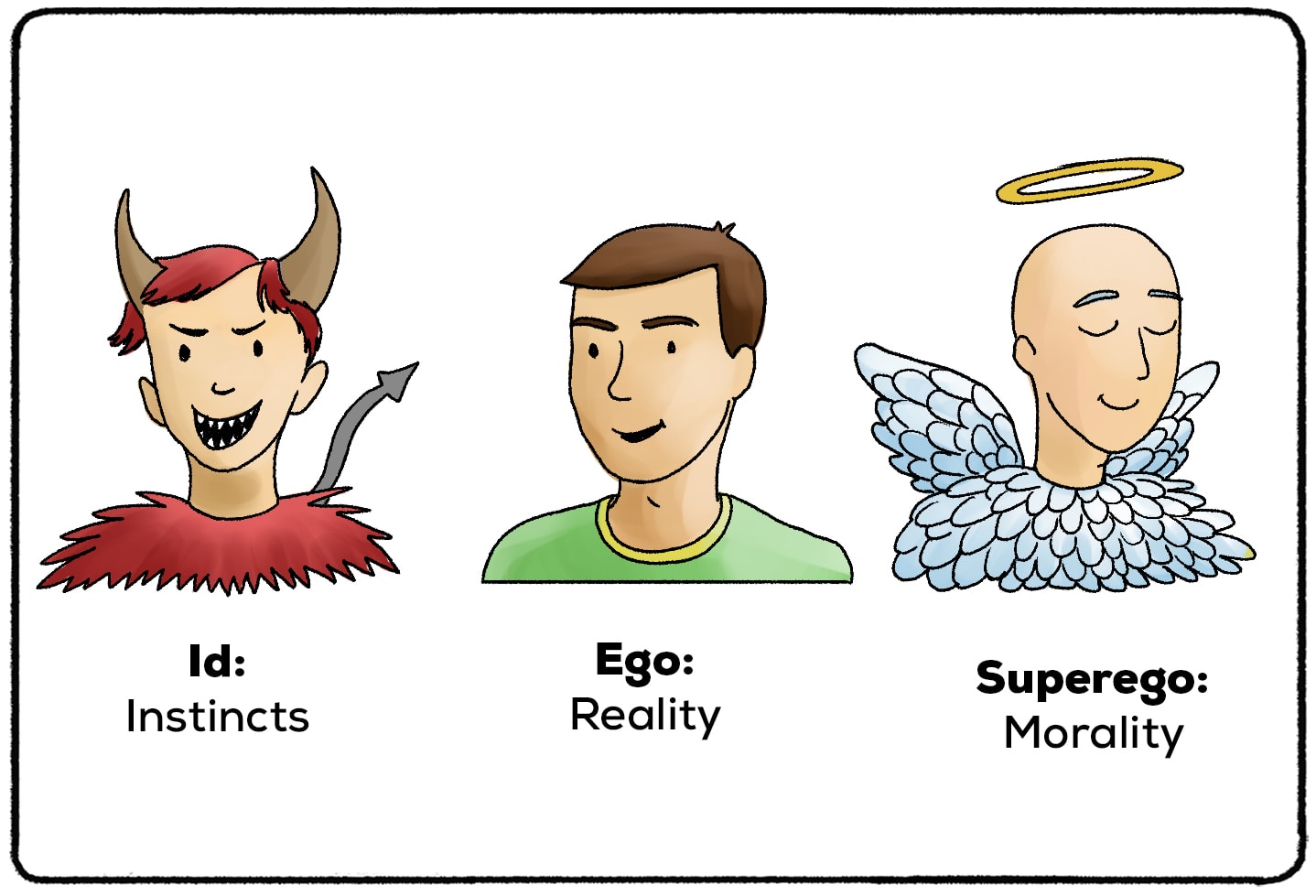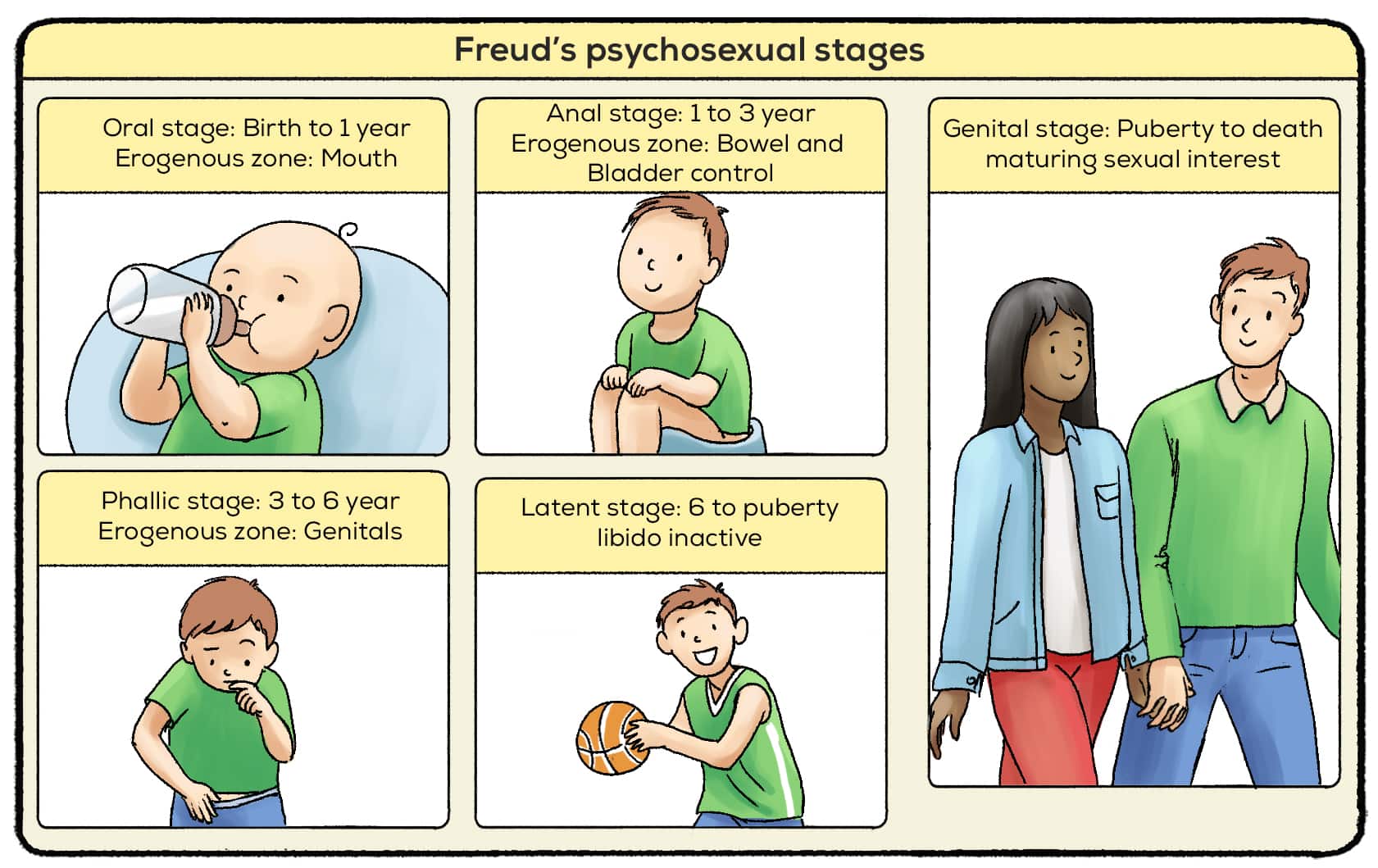We couldn't talk about theories of personality or psychology without mentioning Freud. Sigmund Freud is one of the most famous (and controversial) minds of the 20th century. His psychoanalytic perspective of personality offers a unique way of looking at the body and mind's connection to personality.
What is the Psychoanalytic Theory of Personality?
To know Sigmund Freud's personality theory, you must know the following three terms: Id, Ego, and superego. These are the three parts of your personality driven by unconscious energy. All three are silently going through a struggle to influence our decisions and behavior.

Id
The Id is the “bad boy” of our subconscious. It is an impulsive part of the psyche that seeks pleasure and avoids pain at all costs. The Id wants instant gratification - it is the part of you that grabs for food as a baby or acts to satisfy sexual desires without thinking.
SuperEgo
The SuperEgo lies on the opposite side of the spectrum. This part of the psyche wants to control the Id. If humans acted only based on receiving instant gratification and immediate pleasure, we would all be in a whole lot of trouble. The SuperEgo unconsciously and consciously acts to follow the rules of society and keep the Id from causing serious damage.
Ego
The Ego lies in the middle of these two entities. It is a constant struggle to balance out these two forces and make pleasurable decisions without causing too much damage. It's like a well-minded adult standing between two children wanting to overthrow each other.
Freud and Personality
How do Freud’s ideas influence the way that we shape our personality? One of his theories was that as a child grows into an adult, they encounter five psychosexual stages of development. During each stage of development, the Id is focused on a specific erogenous zone.

The Ego must struggle to balance out the pleasure-seeking Id and the moral superego. During each phase, internal conflicts will result in many struggles. Freud said personality is formed by the process and results of these struggles.
- Oral (Stage 1)
- Anal (Stage 2)
- Phallic (Stage 3)
- Latency (Stage 4)
- Genital (Stage 5)
Freud believes that most of our personality has been formed by age five. At the age of five, a child has gone through the oral, anal, and most of the phallic stages. If the child struggles with balance during these stages, they will develop “fixations.”
Oral fixations include smoking or problems with eating.
If someone fails to master potty training or still struggles during the anal stage, they may be a sloppy or lazy person.
During the phallic stage, Freud believed that boys and girls start to notice the difference in each other and develop The Oedipus Complex and penis envy. The Oedipus Complex is the idea that unconsciously, young boys feel possessive of their mother and, as a result, feel aggressive toward their father. Freud also believed that young girls experienced penis envy and, due to their lack of penis, developed fixations that followed them until they were adults.
Other Psychoanalytic Theories of Personality
Sigmund Freud is the biggest name in psychoanalysis and the psychodynamic perspective, but he is far from the only person who used this approach. Think of psychoanalysis as an umbrella term. Underneath lies the work of Sigmund Freud, Carl Jung, Melanie Klein, and many others. Each of these names contributed their work to the psychoanalytic theory of personality.
Carl Jung and Personality Theory
Carl Jung worked with a lot of the same theories as Freud. He believed the unconscious mind, including the Id, Ego, and Superego, significantly impacted personality. But did you know you can thank Carl Jung for one of the biggest personality tests in the world? That’s right. If you have ever taken the MBTI Personality test, you can thank Carl Jung.
Carl Jung didn’t exactly come up with the ISFJ or ENTJ personality types as we know them today, but he did lay the groundwork for the Myers Briggs Type Indicator. We can trace the “introversion vs. extroversion” categorization back to Jung. He also identified four different “functions” that determine our personality: thinking, feeling, sensing, and intuiting. Sound familiar? That’s because Katherine Briggs and Isabel Myers Briggs were inspired by Jung’s work when they made the MBTI.
Collective Unconscious
In addition to his work that led to the MBTI test, Carl Jung’s most famous theory also addresses how we form our personality. He believed in the collective unconscious. Basically, the collective unconscious is the version of the unconscious that has always been shared throughout humankind. Jung believed that our fears of the dark, heights, or other common fears, for example, can be traced back to experiences that were remembered and shared through the collective unconscious.
Does your personality come from the experiences only you have had as a child, or does it come from the entire history of humankind? These are the questions that the nature-nurture debate continues to ask today!
Melanie Klein and Personality Theory
Melanie Klein was another psychologist who wrote about the impact of the unconscious but did not agree with Freud on everything he wrote. Her most well-known theory, Objects Relations Theory, is a little more comfortable to discuss in a classroom than Freud’s stages of psychosexual development.
Freud believed that personality development was largely influenced by the need to fulfill sexual desires as you age. Klein disagreed. Instead, she believed our personalities and behavior were largely influenced by the desire to form connections and relationships with the people around us. Objects Relations Theory is not about objects like a ball, a bat, or a toy. When Klein refers to “objects,” she refers to people or parts of people (like a mother’s breast.)
Alfred Adler and Personality Theory
The work of Alfred Adler is the work that appears to stray most from Freud while remaining under the psychotherapy umbrella. It’s also the work that seems relevant today, although it faces similar criticisms for not being backed up by science.
Adler did not believe in the collective unconscious or a universal force secretly connecting and impacting personality in the same ways. He believed that the individual faced different journeys, and even his method of psychotherapy would affect each individual differently. However, Adler believed that every child faced similar challenges and motivations from the moment they were born.
Superiority Complex
Freud often pointed to a child’s traumatic past or their need to fulfill sexual desires to assess personality. Adler believed the child’s goals could also determine personality and where they placed themselves on the journey to achieving them.
All children start out feeling inferior, Adler believed. But it’s up to the parent and child to navigate that journey and find security and confidence. A parent who gives the child the love and support they need will likely raise a confident kid who doesn’t mind being inferior as long as they works toward superiority. Children who feel inferior at everything and have no control are more likely to overcompensate.
Alfred Adler was the first to coin the term “inferiority complex.” Although he used examples rather than science to explain this theory, many psychologists now believe he had the right idea.
Child Birth Order
Alfred Adler also believed other factors like childbirth order played into inferiority and personality formation. The youngest child, for example, is always looking at older children and feeling a sense of inferiority. This makes them more likely to overcompensate in life. Only children faced their own set of challenges. Adler theorized that the amount of attention an only child could get from their parents could impact their personality and make them dependent.
Anna Freud, Erik Erikson, and Personality Theory
Sigmund Freud’s daughter Anna Freud was also a psychoanalyst. She pioneered child psychology and believed that children could be psychoanalyzed. (Her father did not.) Through her work, Anna Freud was one of the earliest psychologists to identify and speak about the different stages that children and adults went through.
Anna Freud had a significant impact on Erik Erikson, a psychologist who went on to create the Stages of Psychosocial Development. Unlike the psychosexual stages of development or even Jean Piaget’s Stages of Cognitive Development, the psychosocial stages last until the golden years of a person’s life. A conflict, from trust vs. mistrust to integrity vs. despair, defines each stage. How a person handles that conflict can significantly shape their personality and behavior.
Criticisms
If Freud’s ideas make you uncomfortable, either for the fact that he focuses explicitly on sex or that he seems to frame women as the lesser sex, you’re not alone. Freud has never ceased to face criticism for his work. Unlike many psychologists, he did not use empirical research to support his theories. He worked solely with adults on a case-by-case basis. Since Freud introduced this theory, it has been largely replaced by humanistic and cognitive approaches.
Why Is Freud’s Theory of Personality Important?
The psychoanalytic perspective remains one of the top personality theories, alongside behaviorism and humanism. Unlike humanist theory, Freud’s focus remains on the unconscious. He explores the idea that to discover the root of our personality, we must dig deeper than what we experience on “the surface.”
Psychoanalytic therapy grew out of Freud’s theories. This approach involves a therapist questioning their patient about childhood memories or possible events that led to struggles between the Id and the superego. Freud believed that humans repress many of their emotions; his goal during therapy sessions was to bring unconscious feelings into the conscious mind.

Other Theories of Personality
- Psychoanalytic theories are a fascinating study approach, but they are not widely accepted anymore. What is accepted in the world of psychology today? Other schools of thought may give you a different peek into what today’s psychologists believe forms our personality.
Trait Theories
One way that psychologists have tried to organize and understand personality is through personality traits. Traits are often identified on a spectrum, with two opposites on either side. (Carl Jung is not the only person to identify introversion vs. extroversion - Hans Eysenck made it one of three sets of traits that he focused on in his work.) This is one way to look at personality from three sets of traits to 4,000 total.
Behavioral and Social Cognitive Approaches
Psychologists like B.F. Skinner and Ivan Pavlov theorized that behavior and personality were entirely learned. We learned through rewards and punishments. Later replacements of these theories argued that we learn behavior by watching the behavior of others.
Humanist Approaches
More recent approaches to personality suggest that our personality and behavior come from the desire to fulfill a higher need. Like Erikson’s conflicts, humanist theories focus on the journey a person takes to fulfill their full potential. A person who is trying to achieve self-actualization is certainly going to behave differently than a person who is striving to have their basic needs met.
Psychodynamic theories give us a lot to think about when it comes to developing our personality. How many events in your life can you point out as “defining” moments that shaped your personality? How many events could have changed your personality without your knowledge?
